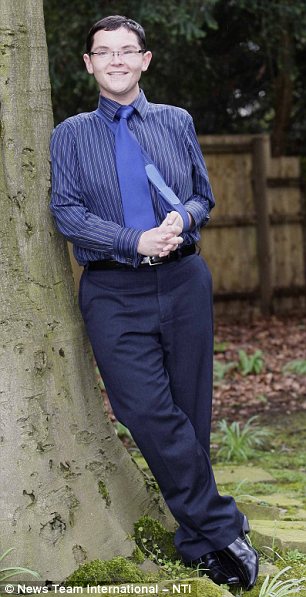
Steven Thorpe, a British teenager who was declared brain dead by four doctors, made a “miracle” recovery after his parents begged medics for a second opinion – moments before his life support was to be switched off.
Doctors described Steven Thorpe as “truly a unique case” after he awoke from a two-week coma following a multiple car crash that left another man dead.
Steven Thorpe was 17 years old when he suffered horrific injuries after the smash which left another man dead.
The teenager was placed in a chemically-induced coma and doctors said he would never recover – they even asked his devastated parents to consider donating his organs.
But Steven Thorpe’s father begged doctors to reconsider and even enlisted private GP Julia Piper to examine him again after being convinced that their son could recover.
Doctors at University Hospital in Coventry, West Midlands, UK, agreed to let a neurologist re-examine him and, astonishingly, he detected faint brain waves indicating Steven Thorpe had a slim chance of making a recovery.
NHS chiefs agreed to bring Steven Thorpe out of his coma to see if he could survive on his own and he stunned medics by making an almost full recovery.
Incredibly, just five weeks later Steven Thorpe was discharged from hospital.

Speaking about his amazing recovery for the first time, Steven Thorpe, now aged 21 and a trainee accountant, said: “My father believed I was still there.
“He expressed his views to Julia Piper and I think she listened very closely to what my dad had said.
“My impression is maybe the hospital weren’t very happy that my father wanted a second opinion.
“I think the doctors wanted to give me three days on the life support machine and the following day they said they wanted to turn it off.
“The words they used to my parents were <<you need to start thinking about organ donations>>.
“I think that’s what gave my dad energy, he thought <<no way>>.
“I think if my dad would’ve agreed with them then it would’ve been off in seconds.
“If my parents hadn’t asked for the second opinion, and if Julia hadn’t been there, I wouldn’t be here today.”
Steven Thorpe, from Kenilworth, Warkwickshire, was travelling home from nearby Leamington Spa in February 2008 when the vehicle he was in was involved in a collision with two other cars and a horse that had run loose.
The crash left one man dead and the horse was also fatally injured.
Steven Thorpe added: “As far as I am concerned, living is a full recovery. From how I was to how I am now, I think it’s a miracle.
“I drive to work every day, I don’t think anything is holding me back. There’s no point dwelling on it, I just pull my socks up and get on with it.
“Hopefully it can help people see that you should never give up. I’ve had so much positive feedback about it.
“If you believe it then follow it, that’s the motto. My father believed I was alive – and he was correct.
“It’s hard for me to even ask my parents about what happened.
“They do cooperate with me because they want me to understand it all but they don’t want to be reminded about it.”
Dr. Julia Piper, who runs a private practice in Leicester, said: “They had doctors saying he wasn’t going to live but the parents felt there was flickers of response and it wasn’t just wishful thinking.
“I had this strong feeling that this wasn’t right and then eventually I got someone else to look at him and of course it proved to have been the right thing to have done.
“It’s an inspirational story about never giving up.
“He’s a remarkable young man and his recovery has been astonishing.”
Since leaving hospital four years ago, Steven Thorpe has had four operations to reconstruct his mangled face – including having his nose rebuilt and an artificial eye socket made.
He also has physiotherapy session to improve the movement in his left arm – which was badly injured in the road smash.
In a statement, University Hospitals Coventry and Warwickshire NHS Trust said: “The injury to Steven’s brain was extremely critical and several CT scans of the head showed almost irreversible damage.
“It is extremely rare that a patient having suffered such extensive trauma to the brain should survive.
“However, critical care and other specialist teams continued to support his systems through his critical period and we were delighted to see Steven recover and make progress against all the odds.
“He is truly a unique case.”